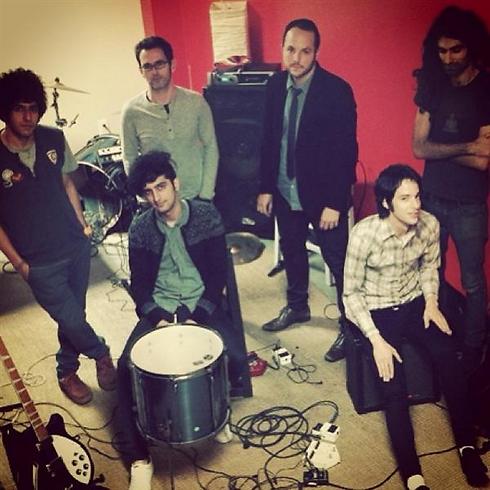
Iranian band 'wanted to perform in Israel'
Lead singer of Israeli band Electra shocked to hear about murder of two members of Iranian Yellow Dogs group he performed with in New York. 'They were very interested in Israel and really wanted to come here,' he says
Nitzan Horesh, the lead singer of Israeli band Electra, knew the Iranian band members personally and even performed with them. "I'm shocked, it's simply disturbing," he told Ynet on Monday night. "I don't know what I'm feeling about it."
Video courtesy of jn1.tv
According to media reports, the murderer was an Iranian musician who police and others say was angry after being kicked out of another band, the Free Keys, about a year ago.
Armed with a rifle, Ali Rafie, 29, snuck down from the roof around midnight on Monday into the third floor of the house and shot dead Ali Eskandarian, a 35-year-old writer and a sometime guest vocalist with the Yellow Dogs, and the brothers Soroush, 27, and Arash Farazmand, 28, the Yellow Dogs' guitarist and drummer, according to the police account.

Nitzan Horesh (sitting down on the right) with members of Electra and Yellow Dogs
The two gunned down musicians were Iranian citizens who lived and worked in Brooklyn, New York, where Horesh and his band members spent some time with them.
"We played with three of them. The fourth drummer was supposed to arrive from Iran or something," Horesh recalls. "In the meantime they were playing with a Greek drummer from Williamsburg. A report about the incident said he was kicked out of the band or something and decided to take revenge. So we didn't know the person reported as the killer."
How did you get to know the band members?
"Our American booking office hooked us up with them. When we arrived in Chicago they told us, 'You won't believe it, there happens to be an Iranian band which is supposed to perform in the city. Let's get you together.' We were really happy to meet them and they were the cutest and most charming people.
"When you go backstage with other bands, you always sit down with them and inquire about the interesting places in the world they come from. In our case it was even more interesting, and we had a lot of jokes about it on stage. We had a special connection.
"In Israel you see the Iranian threat as some kind of a monster, but there is an overwhelming majority of people there who oppose the regime and who are more or less like you. Especially young people. We love the same bands and we grew up on the same things.
"After the performance was over, they were supposed to move on to a different destination, so we suggested that we meet in New York at the end of the route, and then we came over to their place and hung out in Williamsburg."
'Everyone thought they were Israelis'
The Yellow Dogs band members received wide media coverage about three years ago, when they participated in Bahman Ghobadi's Cannes Un Certain Regard award-winning film, "No One Knows about Persian Cats," which was also screened in Israel. The film explores the indie rock band scene in Iran and the struggle of young musicians in Tehran for freedom and the right to play, perform and express themselves through music.
In the movie, which combines a scripted story line with documentary material, the band members are seen performing underground while evading Iranian authorities. The musicians' attempts to get a permit to leave the country are also documented.
"I was in touch with them on Facebook from time to time, and I also knew their manager," says Horesh. "We thought they would come here and we would perform together. We were talking about it all the time. Once every few months we would entertain ourselves with the idea, and somehow we were too busy or they were too busy, so it didn't happen."
What did they think about that idea?
"They really wanted to come here. They kept joking that everyone always thinks they're Israelis because of their look and the way they speak. They were very interested in Israel.
"They knew that the information they were receiving in Iran about Israel was the government's propaganda. In their homes, they never saw Israel as the enemy. They were very intrigued by it actually, and were very much against the Iranian establishment."
Reuters contributed to this report










